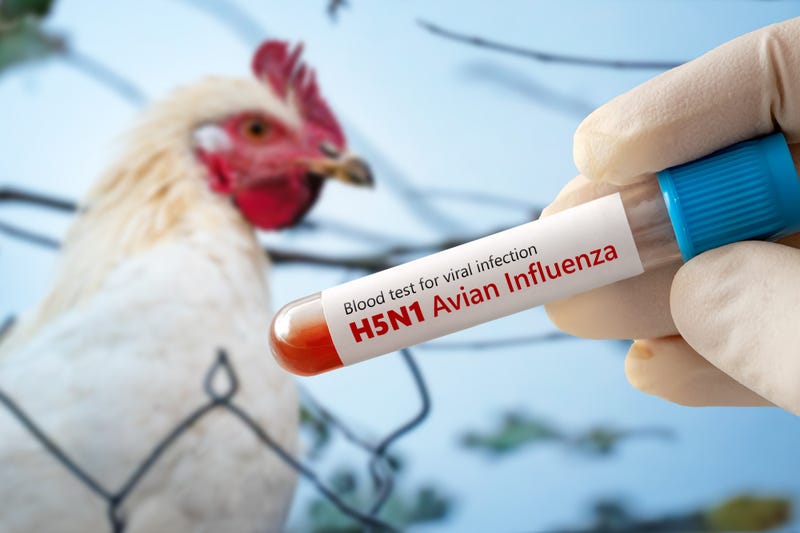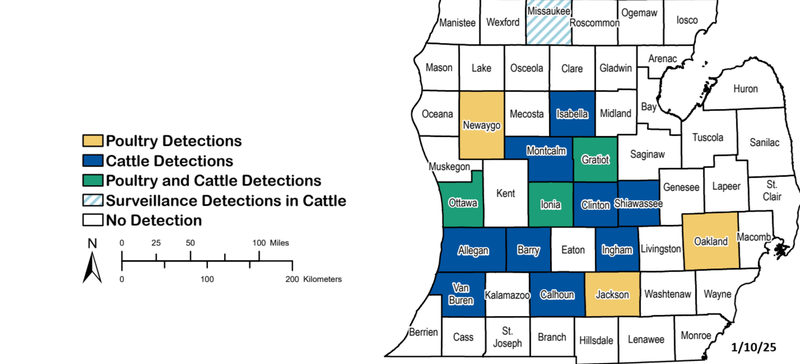
WATERFORD TOWNSHIP (WWJ) Bird flu has been identified in poultry at a Waterford Township park.
The Oakland County Health Division is monitoring a situation involving H5N1 highly pathogenic avian influenza (HPAI) at Hess-Hathaway Park in Waterford Township, in the area of William Lake and Cooley Lake roads. Multiple sources, including the Oakland Press and Detroit Free Press, report that over 100 ducks, chickens, geese and turkeys were euthanized after many of them tested positive for bird flu.
According to the Oakland County Health Division; eleven people who had direct contact with the animals are being monitored for ten days, which began Thursday (January 9th). They said one of those people is experiencing symptoms. That person's influenza test results are pending from the state lab. Initial reports said two people showed symptoms, but the Oakland County Health Division has since updated their information.
“The risk of contracting bird flu is very low for the general public, but it’s important to be aware of the disease in the community,” said Oakland County Director of Health and Human Services Leigh-Anne Stafford. “Protect yourself and prevent bird flu by avoiding direct contact with sick or dead birds and wash your hands thoroughly if you come into contact with them."
The farm at Hess-Hathaway Park is taking precautions to keep the public safe.
“Until further notice, portions of the farm will be closed to protect our animals, staff and visitors. However, the rest of Hess-Hathaway Park remains open for community enjoyment,” Township Supervisor Anthony Bartolotta said. “We appreciate the community’s cooperation, patience and understanding as we work to return our farm to regular operations. We look forward to reopening in the Spring of 2025.”
Across the state; the virus has been detected in either poultry, dairy cattle or both in more than a dozen counties.

Oakland so far is the only country in Metro Detroit with confirmed cases—in poultry alone, according the Michigan Department of Agriculture and Rural Development.
Health officials say you should take great care to properly cook your eggs and poultry, and avoid consuming raw milk or milk products.
Also, do not touch sick or dead birds and animals, or surfaces contaminated with bird droppings or body fluids. Use recommended Personal Protective Equipment (PPE) if you must come into contact with the birds.
Call your doctor if you’ve had close contact with domestic fowl or wild birds and have bird flu symptoms:
-Eye redness and irritation (conjunctivitis)
-Mild fever (100 degrees Fahrenheit or greater) or feeling feverish (fever may not always be present)
-Cough
-Sore throat
-Runny or stuffy nose
-Muscle or body aches
-Headaches
-Fatigue
-Shortness of breath or difficulty breathing
Less common symptoms include diarrhea, nausea or vomiting.
Bird flu can range from asymptomatic to severe.
According to the Centers for Disease Control and Prevention (CDC); 66 confirmed human cases of H5N1 bird flu have been reported in the United States since April of 2024. A Louisiana resident, who had been hospitalized with the virus since December, became the first person in the country ever to die of H5N1-- on Monday, January 6th, 2025. NBC News reports the person was over the age of 65 and had underlying medical conditions.
The CDC reiterated that the risk “to the general public” remains low.
“Most importantly, no person-to-person transmission spread has been identified,” they wrote. “As with the case in Louisiana, most H5 bird flu infections are related to animal-to-human exposures. Additionally, there are no concerning virologic changes actively spreading in wild birds, poultry, or cows that would raise the risk to human health.”
Analysis of the Louisiana patient’s viral samples showed a difference in the genomic sequences than were detected in the poultry on his or her property— suggesting the virus may have mutated inside the patient's body after infection.
However, the CDC concluded the changes were not significant enough for the virus to render a greater threat to the public overall, or to increase its ease of transmission.
Of the 66 people who contracted the virus, only two had not had known contact with infected birds. Both recovered.
Data from the U.S. Department of Agriculture cited by the University of Maryland Extension indicates that 7% of all U.S. households own a small flock, with an average size of 49 birds. Throughout the country, there are more than 138,000 small backyard flocks.
Audacy reported in December that the USDA mandated that the entire national milk supply be tested for bird flu. The move came amid concerns about H5N1, which has spread to over 720 dairy herds across 15 states since March.
Further action tips from the Oakland County Health Division: If bird flu is suspected in a domestic flock, contact Michigan Department of Agriculture and Rural Development (MDARD) immediately at 800-292-3939 (daytime) or 517-373-0440 (after hours). Additionally, report cases of unusual or unexplained deaths among wild bird populations by contacting the Michigan Department of Natural Resources at 517-336-5030.
More information about bird flu can be found on the Health Division’s website at oakgov.com/health or by contacting Nurse on Call at 800-848-5533 or noc@oakgov.com. Nurse on Call is available 8:30 a.m. to 5:00 p.m., Monday through Friday. For up-to-date public health information, follow @publichealthOC on Facebook and X.
Read the initial alert from MDARD here. For additional bird flu information from the state, click on michigan.gov/birdflu.
